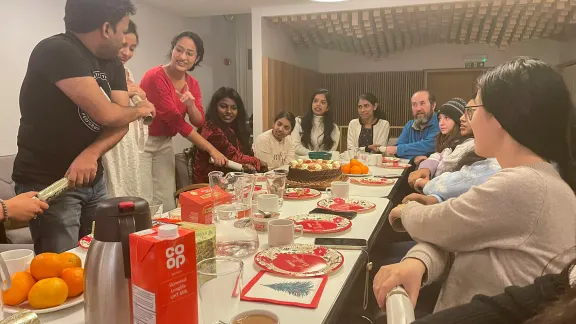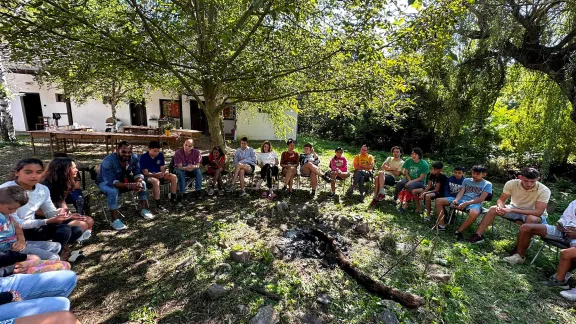A new learning program will be presented at Krakow Assembly on ‘Seeking Conviviality: the art and practice of living together in increasingly fragmented and unequal societies.’

Participants at a Christmas meal organized by the ‘Eat and Encounter’ program to foster friendships among international students in London. Photo: Rev. E.M. Skillingstad
Diaconal workers from LWF’s European regions will present work for more just and inclusive societies
(LWI) - Diaconal workers from member churches of The Lutheran World Federation (LWF) across Europe will be presenting a new ‘Conviviality’ learning program at the Thirteenth Assembly in Krakow in September, sharing experiences of creating action for more just and inclusive societies within very diverse contexts.
For more than a decade, diaconal actors from LWF's three European regions have been developing the concept of ‘Seeking Conviviality’ as ‘the art and practice of living together’ in increasingly fragmented and unequal societies. The concept is inspired by Jesus’ words in Matthew’s gospel: “Whatever you did for one of the least of these brothers and sisters of mine, you did for me.”
More than seventy leaders of local diaconal projects have participated in the process, reflecting together on how to promote greater hospitality, inclusion and more equal economic structures. Participants have produced a series of four publications showcasing many examples of the ways in which diaconal groups have worked with marginalized communities, transforming themselves in the process into “churches of radical welcome.”
By seeking convivial life together, it is possible to cross boundaries, create safe spaces for everyone and promote tolerance and hospitality.
LWF Program Executive for Capacity Building and Leadership Development, Rev. Katariina Kiilunen
LWF’s Program Executive for Capacity Building and Leadership Development, Rev. Katariina Kiilunen, notes that “the theme of the Thirteenth Assembly challenges us to ask what “oneness” means and how can we, with our great diversity, live in peace, seeing ‘the other’ as a unique child of God?” She continues: “These questions are at the heart of the Conviviality process. By seeking convivial life together, it is possible to cross boundaries, create safe spaces for everyone and promote tolerance and hospitality through the practice of justice.”
In the UK, the ‘Eat and Encounter’ program, initiated by the International Lutheran Student Centre (ILSC) of the Council of Lutheran Churches (CLC) in Great Britain, seeks to foster a sense of belonging among international students attending various London-based universities and colleges. “Students from different parts of the world come to cook and share a meal together, helping them to overcome geographical and cultural boundaries and create bonds of friendship”, says Rebecca Daniel, ILSC chaplain and a member of the Conviviality process. “This initiative has enabled many students to overcome their sense of isolation, while also deepening their appreciation of difference,” she adds.

Participants in a camp organized by ‘Drop in the Sea’ Foundation for Roma children and students from high school and university in Budapest. Photo: A.N. Panka
Another example is the ‘Drop in the Sea’ Foundation supported by the Evangelical Lutheran Church in Hungary. Each year, Roma children from the town of Pilis spend a week camping and enjoying activities with high school and university students from Budapest. The foundation’s coordinator Anna Nagy Panka says: “It is important for these young people to gather together and enjoy a safe space where they can feel accepted, as they are.”
Delegates from all LWF’s member churches will gather in Krakow from 13 to 19 September to explore the theme of ‘One Body, One Spirit, One Hope’. The Conviviality work will be presented, both at the Assembly’s ‘Jarmark’ or marketplace and through two workshops and the publications that are available in various languages for other churches interested in joining the process in different parts of the world.


